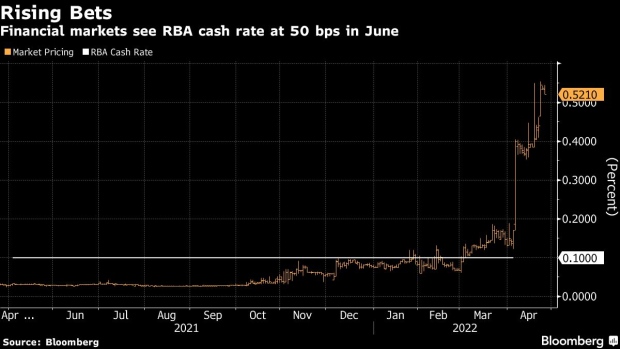Apr 26, 2022
Australia’s Surging Inflation Builds Case for Election Rate Hike
, Bloomberg News

(Bloomberg) --
Australia’s core inflation breached the top of the central bank’s 2-3% target for the first time since 2010, sending the currency higher and boosting the case for an interest rate hike just weeks out from an election.
The annual trimmed mean gauge, a measure that strips out volatile price changes and is closely followed by the Reserve Bank, rose 3.7% in the three months through March, exceeding a forecast 3.4% increase, Australian Bureau of Statistics data showed Wednesday. On a quarterly basis, it rose 1.4% versus a forecast 1.2% gain.
Swaps traders are now fully pricing in a 15-basis-point hike for next week’s RBA meeting that would lift the cash rate to 0.25%. The Australian dollar and three-year government bond yields also advanced.
“Continued shortages of building supplies and labor, heightened freight costs and ongoing strong demand contributed to price rises for newly built dwellings,” Michelle Marquardt, head of Prices Statistics at the ABS, said in a statement. “The CPI’s automotive fuel series reached a record level for the third consecutive quarter.”
The result intensifies pressure on RBA policy makers to initiate rate liftoff, having been accused of falling behind the curve given global counterparts have already embarked on tightening. The RBA has signaled its first hike is getting closer, though most economists expect it will keep the cash rate at a record-low 0.1% next week to avoid embroiling itself in the May 21 election.
Still, today’s strong report may be enough to prompt Governor Philip Lowe to abandon the RBA’s traditional political caution and move on May 3. Some economists are also switching their calls to an outsized 40-basis-point move in June, with Goldman Sachs Group Inc. the latest to do so.
Inflationary pressures worldwide have been escalating, intensified by Russia’s war on Ukraine. While global supply chain disruptions driven by China’s stringent lockdowns to curb Covid-19 suggest little prospect of an early abatement of price rises.
That has prompted a host of central banks including those in New Zealand and Canada to deliver jumbo rate hikes, with the Federal Reserve expected to follow suit.
©2022 Bloomberg L.P.






